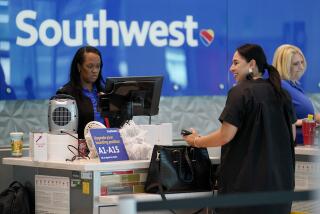Airlines Take Big Risks in Ruthless Fare Wars
- Share via
With fare wars heating up, much of the turbulence in the travel industry these days is on the ground.
Reeling from a slump in travel since the Persian Gulf War began, the airlines are luring wary fliers with ticket giveaways and bargain fares that are likely to eventually widen already huge financial losses.
“The fact that they are selling tickets at deep discounts--that should increase losses,” said Mark Daugherty, airline industry analyst for Dean Witter in New York.
Daugherty said weaker airlines are willing to risk losses with low ticket prices in order to raise badly needed cash. “That is what is driving a lot of these companies,” said Daugherty.
The latest salvo came Tuesday as money-losing Northwest Airlines, responding to a steep decline in transatlantic travel, slashed fares to Europe by up to 40%. Northwest’s competitors are expected to match the lower fares.
The aggressive price cut represents an about-face for Northwest. A week ago, the Eagan, Minn.-based airline tried to raise fares with a $7.50 one-way surcharge. It was forced to withdraw the surcharge when the industry failed to go along.
Northwest’s action followed a round of fare cuts for travel between the U.S. and London. British Airways on Sunday ignited the round by chopping its 30-day advance purchase fares by one-third. Pan American World Airways and Trans World Airlines responded quickly, with TWA saying that it would slice its fares in half.
International air fares are subject to government approval. The U.S. Department of Transportation said late Tuesday it would consider approval of British Airway’s cuts if it covers travel that starts by April 30.
British Air had proposed the cuts for travel that began and ended any time between April 6 and Oct. 31.
The government said it wanted the period shortened because it was unclear which U.S. carriers would be serving London later. United has agreed to buy Pan Am’s routes while American has agreed to buy routes belonging to TWA.
Those sales must be approved by the British government. The Transportation Department’s action on Tuesday was viewed as a way to pressure the British on the London route negotiations.
The European fare war got under way as a half-price sale on domestic fares ended.
The battle for passengers hasn’t been confined to fare discounts, although they are the most visible weapons.
Even healthy airlines are trying to boost travel with lures aimed at frequent fliers. For making a specific number of trips, airlines are handing out free tickets. Other airlines are offering triple miles that can be compiled to get free tickets later.
The frequent flier bonuses are targeted at business fliers, many of whom would probably travel anyway. Travel industry executives said the programs really don’t generate new customers for the airlines.
Rather, the programs help the airlines keep the customers they already have.
To this extent, it appears the programs are working. “The falloff in travel appears at the leisure end of the industry,” said Randy Peterson, editor and publisher of Frequent magazine in Colorado Springs. “If you look at business travel you see little change” from a year ago.
Peterson said the current frequent flier programs are better than in the past. He said earlier ticket giveaways required midweek departures and staying over Saturday night.
The low fares and other promotions make “the current climate better than it’s ever been” for consumers, said Peterson.
But it was unclear Tuesday whether the price cuts, especially on European routes, would help travelers get over concerns about security that have cropped up since war started in the Persian Gulf.
Some companies won’t let employees travel on U.S. airlines because they think foreign airlines are safer. A handful of companies prohibit flights on British or French carriers as well.
C. Thomas Nulty, president of Associated Travel in Santa Ana, said he recently routed one client to London from Los Angeles on Scandinavian Airline Systems via Stockholm. “It is not the way most people want to travel,” he said.
The transatlantic fare cuts won’t sway many business travelers, mostly because they don’t have time to plan trips 30 days in advance. Leisure travelers have time to plan, “but they tend to be kind of skittish,” said Peterson. “Grandma worries about terrorism on flights to Davenport, Iowa.”
More to Read
Inside the business of entertainment
The Wide Shot brings you news, analysis and insights on everything from streaming wars to production — and what it all means for the future.
You may occasionally receive promotional content from the Los Angeles Times.










